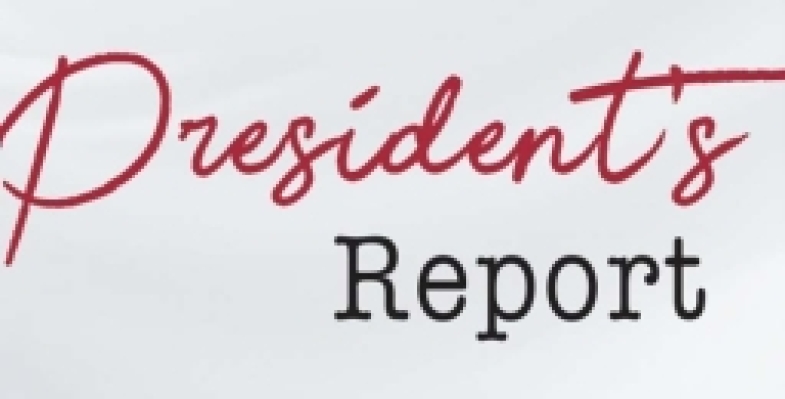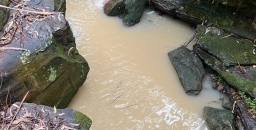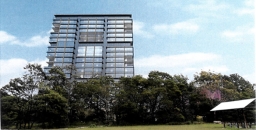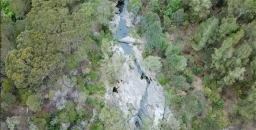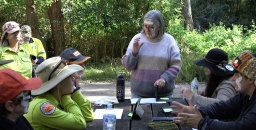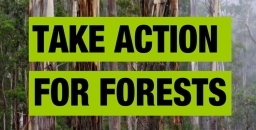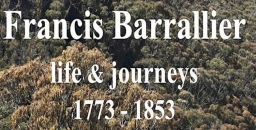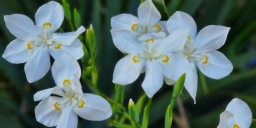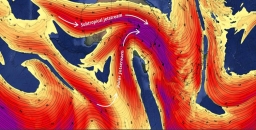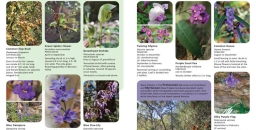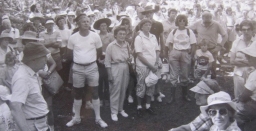Welcome to the annual report on the 45th year of operation of STEP Inc. There is a brighter outlook for the environment in 2023 following the election of the Minns Labor government. But we have to be vigilant in advocating for stronger action.
The report on the NSW Review of the Biodiversity Conservation Act was scathing about the loss of biodiversity over the past
5 years that was supposed to be conserved under this Act. Strong action is required in implementing the recommendations. The same applies at the federal level as we await release of the revision of the EPBC Act.
A change of attitude towards coal and gas mining, native forestry and land clearing is vital for progress on climate change and loss of biodiversity.
Activities
Talks
Our post AGM talk in 2022 was given by Professor Michelle Leishman on creating resilient urban green spaces in the face of climate change.
So far in 2023 we have held talks on the aboriginal heritage of the Ku-ring-gai GeoRegion, Powerful Owls and the future approaches to bushland management in Hornsby Shire. We will be hearing about Ku-ring-gai bushland management in a talk by Jacob Sife on 25 November.
Walks
We scheduled 7 walks that featured national parks and the variety of vegetation that is a feature of northern Sydney bushland. John Martyn also introduced us to new reserves in outer Sydney; well worth a visit. With the period of hot weather lengthening we are reluctant to schedule walks during the November to February period. We thank our volunteer leaders, David Roberts, John Martyn, Helen Logie and Mark Schuster who shared their local knowledge and Beverley Gwatkin who has organised these walks.
Publications
We are still offering a year’s free membership to anyone who buys a book or map. Sales of our maps is still strong and there is a steady demand for our books.
We printed an updated version of the Middle Harbour North map. There is still a demand for paper maps that give a big picture for planning of potential walk itineraries.
Committee
The STEP committee has, as always, been a great group of people to work with. We owe a huge thank you for all their efforts.
We thank Jim Wells for keeping track of our finances and compiling monthly finance reports. Trish Lynch continues to keep Facebook up to date and find news of local activities and wildlife discoveries. We have closed down our Twitter account because the decline in its popularity. John Burke did a great job of highlighting environmental issues while Twitter was a strong source of commentary.
There have been several issues to review this year, often this is in association with other groups such as the Natural Turf Alliance. The committee members work well together in organising activities, responding to questions from the public and, writing submissions.
Newsletter
We are continuing to publish five issues of the newsletter each year. We have ceased providing hard copies of STEP Matters with members receiving a pdf version via email. Links to individual topics are also included in the email and are on our website so anyone can pick out particular articles of interest. These articles also have links to previous articles on related topics and all our past newsletters are on our website.
While the newsletter concentrates on local issues and events we also cover broader national environmental issues that affect us all. We aim to be educational but not too technical. I hope they are of interest, but feedback is welcome. Also, contributions from members about local events and developments can be published in the newsletter or on Facebook. If you have read a book that you think will be of particular interest to our members, please send us a review.
Accounts
The net cash balance at the end of the financial year reduced compared to last year because we awarded three research grants (see more detail below).
The Environment Protection Fund (EPF) balance is on-hold in case a major issue arises. We need to maintain this separate fund that is part of our deductible donation status. The fund’s purpose is to support our environmental objectives. We received a total of $365 in donations in the past financial year.
Our general fund can be used to support educational projects as well as the EPF. We are keen to support more environmental projects so please contact us if you have any ideas.
Again we thank Allan Donald, chartered accountant for his completion of the audit on a pro bono basis.
Education and research grants
The John Martyn Research Grant supports student research in an area relating to the conservation of bushland. The grant for 2023 was awarded to Margarita Gil-Fernandez to support her research on anthropogenic disturbance and its impact on mycorrhizal fungal diversity.
STEP will also award an ad hoc research grant for worthwhile projects. Vanessa McPherson and Michael Gillings gave a talk to members last year about their research into coral fungi that has ramifications for improving strategies for bushland restoration. We awarded a grant to Vanessa that will help progress her research.
For many years STEP has been donating a prize in the Young Scientist Awards run by the NSW Science Teachers Association. The selection of a winning project out of a wide range of ecological issues is an interesting exercise. We are still judging this year’s entries with help from Syd Smith and Gaye Braiding.
Advocacy
Synthetic turf and the Westleigh Park development with its extensive ‘unsanctioned’ mountain bike trails in endangered turpentine forest were again our main areas of attention. It is concerning that the current government sports grant system is facilitating the installation of synthetic turf instead of improving natural grass with the result that the field is effectively no longer a space for community use and other sports. The Chief Scientist’s report on synthetic turf highlighted the environmental harm and potential risks health from the use of this product. STEP, as part of the Natural Turf Alliance, is calling for a moratorium on its installation and awarding of grants until guidelines are issued by the NSW government and further research can be carried out.
There were many issues with the approval process carried out by Ku-ring-gai Council in relation to the synthetic turf at Norman Griffiths Oval but its installation is proceeding.
We made submissions on the major Hornsby Council development plans at the quarry and Westleigh that currently do not provide protection for this high quality bushland.
Submissions were made on some Ku-ring-gai Council plans of management and the Urban Forest Strategy.
The Mirvac development at West Pennant Hills continues to need scrutiny and submissions. There are still concerns about excessive development plans at North Turramurra Recreation Area, Lourdes and Eden Gardens that have not been resolved.
Conclusion
A community group like STEP works best with many lines of communication. We enjoy a good relationship with other community groups and local council staff. Information sharing is an important part of our work. To that end we appreciate feedback from our members and reports on local issues that we may not be aware of. It is becoming harder to keep track of local developments as the local newspapers have shrunk considerably.
Jill Green, President
29 October 2023

